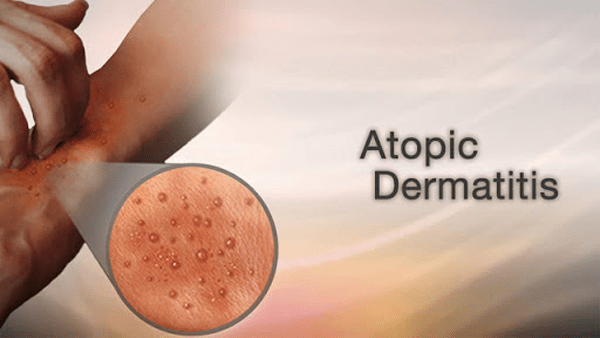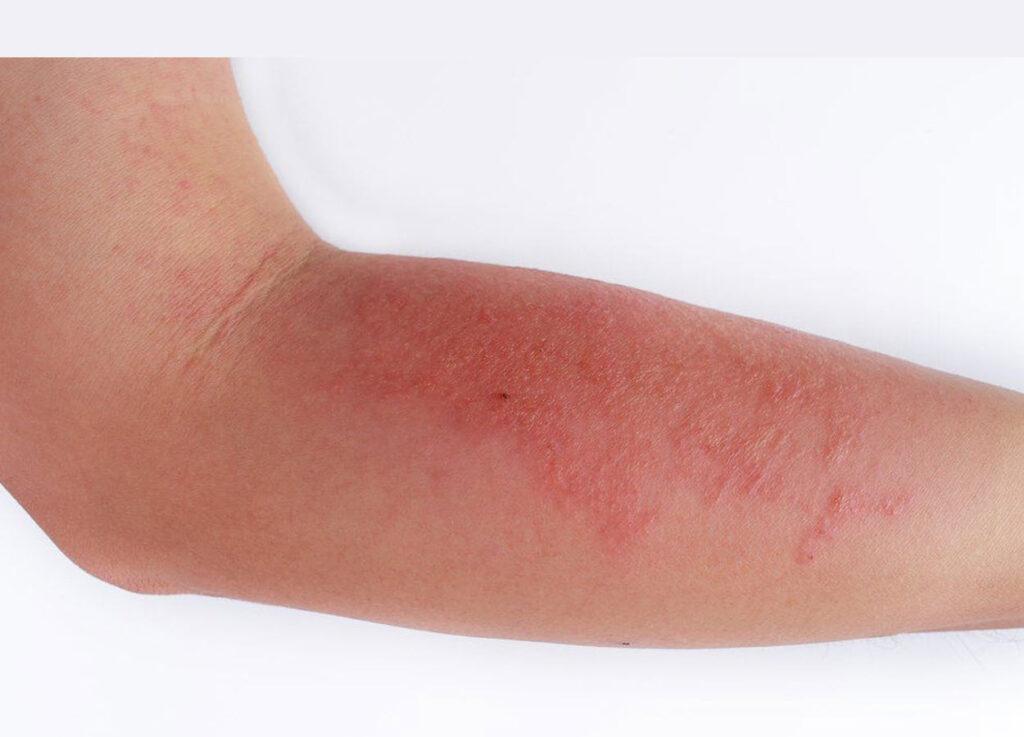Looking for Atopic Dermatitis Treatment in Bangalore? The Venkat Center Provides the best solution of Atopic dermatitis also called Atopic eczema is an itchy, dry, allergic skin disorder affecting many people. It is common in children but can occur at any age. It is not infectious or contagious.
Causes of Atopic Dermatitis
The exact cause of atopic eczema is unknown. It frequently occurs in families whose members already have other allergic diseases such as asthma, and rhinitis (repeated sneezing). Such individuals are called “ATOPIC” and are more likely to get eczema as they tend to develop allergies. Such tendencies may be hereditary in about 30% of patients. The patient or some family members may have other hypersensitive conditions like asthma or hay fever.


Are allergens the cause of atopic eczema?
Yes, external allergens such as dust, food, pollen etc. may be important in about 30-40% of patients, particularly those with severe eczema.
What are the precipitating and exacerbating factors for eczema?
Apart from those mentioned above. Physical factors such as cold, heat, sweating, wind, etc are very important exacerbating factors.
How does Atopic eczema manifest?
Eczema often starts very early in life – at about 3 months of age – as an itchy red rash over the face, which keeps subsiding and recurring. As the child grows, in childhood, the rash occurs over body folds such as knee and elbow. Often it improves at the age of 4-5 years.
The rash may appear red, wet and weepy or dry, thickened and scaly. Scratching often aggravates the rash. The skin thickens and becomes darker. It is a chronic condition. It can affect any part of the body, particularly the elbow bends, the back of the knees and the neck.
In adults, eczema may be localized to hands/feet, ears, around the mouth etc.
Is atopic dermatitis sometimes associated with food allergies? can the elimination of certain foods be of help?
Certain foods may sometime provoke attacks, especially in infants and young children. This is uncommon in adults. Elimination of foods brings about an improvement in the condition in selected cases – however, this should be done under professional supervision and guidance.
It is important to note that young children need a properly balanced diet and in the enthusiasm to search for a cause for eczema, one should not stop foods unnecessarily.
Are the inhaled and contacted substances in the environment important causes, and should they be eliminated?
Yes. Dust and dust-forming objects (for example, feather pillows, kapok pillows and mattresses, dust-forming carpets, drapes, toys and certain rough garments such as wool, and coarse silk) worsen the rash. Try to wet mop or vacuum floors, rather than sweep. Reduce contact with animal furs.
Is allergy testing useful in finding the offending substances? Is desensitization helpful?
Allergy testing can be helpful though it is done only in resistant cases. However, the tests are cumbersome and should be done only with experienced hands. Desensitization generally does not help.
Atopic Dermatitis Treatment
See your dermatologist. Note the following aggravating factors for itching:
- Rapid changes in temperatures, strenuous exercise and hot weather.
- Rough, tight & woollen clothing.
- Frequent use of soaps, bubble baths, and hot water. Use mild detergents for your clothes and rinse the clothes thoroughly during washing.
- Emotional upsets.
It is to be noted that atopic dermatitis treatment is long duration and recurrent and it is important to comply with the treatment. Proper precautions such as those above can help to reduce the intake of drugs.
They usually prescribe external remedies including corticosteroid creams, antibiotic creams, and moisturizers. Use the creams sparingly. Do not use strong steroid creams for long periods as over-use will harm the skin. Use weak steroid creams when your eczema is mild. However, do not be too scared to use creams sufficiently.
Oral medications include antihistamines to relieve and prevent itching – these may have to be given for a long duration. There is some evidence to show that if given for a sufficiently long duration, these may help in reducing steroid usage. Corticosteroids taken by mouth or given by injections should be avoided if possible. However, when all other measures have failed, systemic cortico-steroids for short periods may be needed.
Recently drugs called topical immunomodulators (such as tacrolimus and pimecrolimus) have become available. Generally, 90% of children outgrow the condition by early teens, although some continue to have problems even as adults.
Are there any other problems?
Bacterial infection (pus) and viral infection (eg. herpes simplex) can occur. Antibiotics and antiviral treatment are needed.



